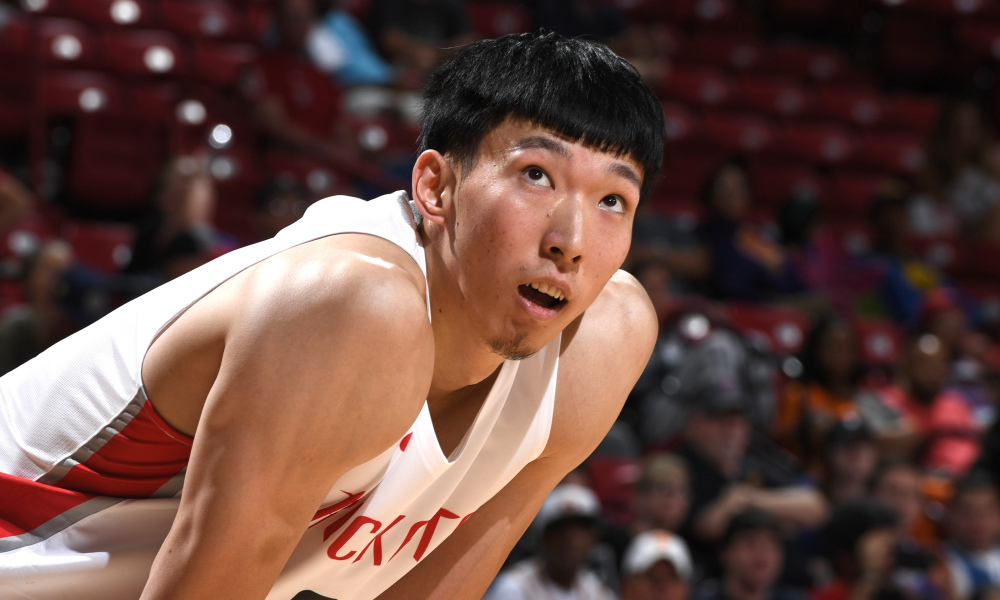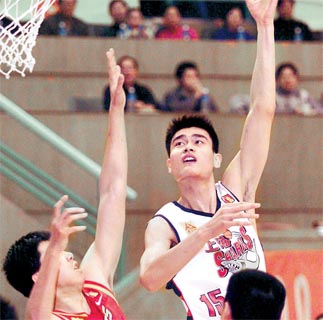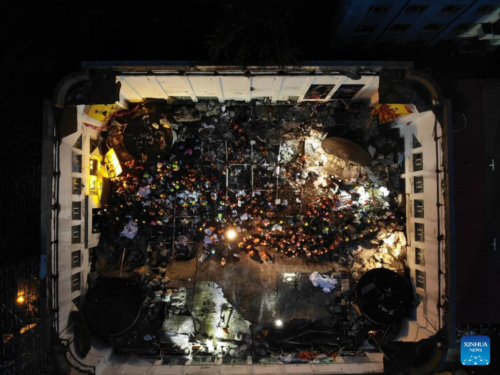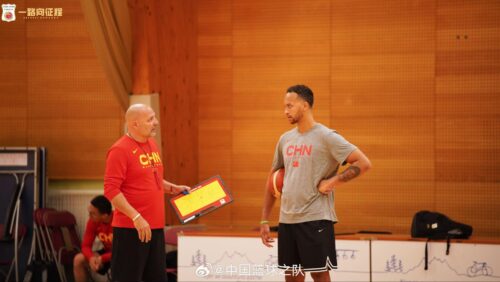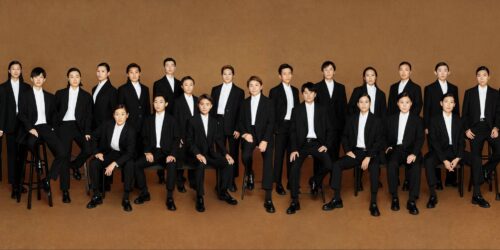Zhou Qi released by Houston Rockets, while Yao Ming referenced in racist Lil Pump verse

The China Sports Column is a The China Project weekly feature in which China Sports Insider Mark Dreyer looks at the week that was in the China sports world.
Lots to unpack this week in the world of sports. The national soccer team has been preparing for the Asian AFC Cup in the UAE, where China will face Kyrgyzstan, the Philippines, and South Korea next month in the group stages.
And it’s also been stylin’.
Thanks to a four-year hookup with Ermenegildo Zegna, the suit maker has once again dressed the national team, and the results are out:
At first look, it’s pretty clear that some of the players look rather awkward in their suit and sneakers combo, not least 70-year-old manager Marcello Lippi, though he’s not known for his smiles.
But on closer inspection, it’s also clear there’s been some photoshopping going on.
Zhang Linpeng 张琳芃, who stands two to the right of Lippi, is usually pictured with a large and distinctive tattoo covering the whole left side of his neck. But in this “official” picture, it’s nowhere to be seen.
Regular readers will remember that players were ordered to cover all visible tattoos with bandages at the China Cup in March. Zhang didn’t play in that tournament — officially due to injury — though with his neck tattoo requiring more impractical wrappings than most, many fans were highly skeptical about the reason for his absence.
Tattoo ban latest humiliation for China’s beleaguered soccer team
And while Zhang has represented China since then, Lippi has privately complained that he hasn’t been able to freely use Zhang — whom he considers to be China’s best player — because of pressure from above.
With the AFC Asian Cup matches providing the brightest spotlight for the team since it failed in its World Cup qualification last year, it will be fascinating to see whether Zhang is allowed to represent his country when the leaders will be watching.
There was disappointing news from Houston this week as the Rockets announced they had waived 22-year-old forward Zhou Qi 周琦. Drafted 43rd overall in the 2016 NBA Draft, he joined the Rockets during the 2017-18 season and played a total of 21 games, all them in a mop-up role, when the game was already decided. However, he did get plenty of playing time the past two seasons with the Rockets’ minor league affiliate, the Rio Grande Valley Vipers, in the G League.
Zhou already has a CBA ring on his resume from 2017, when he also picked up Defensive Player of the Year honors, but it’s hard to see another NBA team giving him a look, with a return to the CBA most likely.
Unfortunately, it means this Nike ad from last year, featuring various players telling Zhou Qi not to come back to China (i.e., to make sure he made it in the NBA), now ends up looking a little silly.
Ding Yanyuhang 丁彦雨航 remains the sole Chinese player in the pro ranks in the U.S., playing for the G League’s Texas Legends, but after undergoing arthroscopic surgery on his right knee in Dallas this week, it will be at least another two months before he’s back on the court.
China won’t ever produce another Yao Ming 姚明, but the search for China’s next NBA regular goes on.
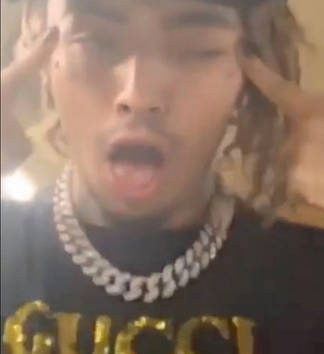
Speaking of Yao Ming, the Chinese legend has been referenced in a song by rapper Lil Pump — and it hasn’t gone down well at all.
The 18-year-old Colombian-American artist teased a song on his Instagram account this week, which included the line, “They call me Yao Ming ’cause my eyes real low (Ching Chong),” emphasizing the slight by pulling the corner of his eyes.
Previous incidents have sparked discussion about whether or not this gesture is offensive: Supermodel Gigi Hadid was kicked out of a Victoria Secret fashion show in Shanghai after photos of her making a slit-eye gesture went viral, while Argentinian striker Ezequiel Lavezzi struck a similar pose last year while wearing the kit of his CSL team, Hebei Fortune.
https://twitter.com/DreyerChina/status/862961144318763008
But this latest incident has certainly gotten the attention of the Chinese rap scene, with Li Yijie of Sichuan hip-hop group Chengdu Revolution (CD Rev) issuing a diss track called “Fxxx Lil Pump,” which quickly went viral.
CD Rev has form when it comes to protecting the nation’s honor, after their 2016 track “This is China” was promoted by the Communist Youth League, though China had its own issues with unsavory references this week after fans at a recent Shanghai Sharks game taunted opposition players and officials from Nanjing over the “Rape of Nanking,” asking why Japanese forces hadn’t killed all of them.
Meanwhile, Shanghai rapper Tommy Sire told AFP: “I think it’s a good thing for a Chinese rapper to come out and diss back in the hip-hop culture, because this can allow American hip-hop enthusiasts to know that China has such a culture. Although it may not be a positive exchange, it’s a form of exchange to some extent. This may also cause the Chinese rap circle to be more united because they found a common enemy.”
Maybe their common enemy can also be Chinese authorities’ aversion to tattoos and hip-hop culture.
Finally this week, Chinese soccer’s brain trust — not exactly known for being packed with sharp — met in Jinan on Thursday to announce their latest ideas. Here’s a summary:
- Salary cap of RMB 10 million ($1.4 million) for CSL clubs from next season (though national team players can get paid 20% more).
- Wage bill cannot exceed 65% of expenditure in 2019, lowering to 60% and 55% for 2020 and 2021.
- Total expenditure cannot exceed RMB 1.2 billion ($174 million) in 2019, RMB 1.1 billion ($159 million) in 2020, and RMB 900 million ($130 million) in 2021.
- Individuals can invest a maximum of RMB 650 million ($94 million) in a team in 2019, RMB 560 million ($81 million) in 2020, and RMB 300 million ($43 million) in 2021, with deficit limits also set.
- Existing CSL rules on Under 23 player quotas remain (one to start, three to play in each game).
- CSL clubs will be required in the future to field a female side, with investment worth RMB 15-30 million ($2 million to $4 million).
- Penalties for failing to meet the regulations include a cut in a club’s new-signing quota for both domestic or international players during a transfer window.
As usual, it’s all well-intentioned stuff, as is the move to eradicate “yin and yang” contracts, under which the league signs off on one contract, but the player is paid according to another, more lucrative contract.
But the lack of planning, scrutiny, and transparency will no doubt enable creative club officials to exploit loopholes and maneuver their way around the rules.
The spending has been blamed for a lack of opportunities for young Chinese players, but in truth there are far more institutionalized reasons for the dearth in talent.
Developing youth team players and bringing them through into the first team requires strategic long-term planning, but there’s little incentive for clubs to do so when the ground rules change so dramatically every year.
After all, who could seriously be expected to adopt to a salary cap at just three months’ notice?
The China Sports Column runs every Friday on The China Project. Follow Mark Dreyer @DreyerChina.
